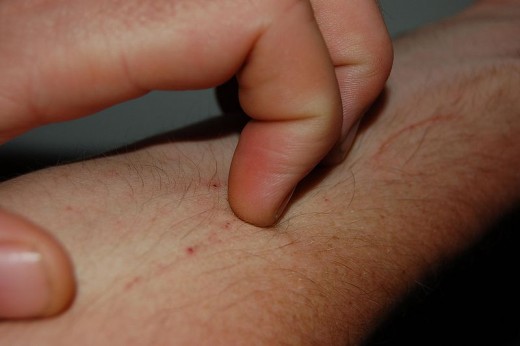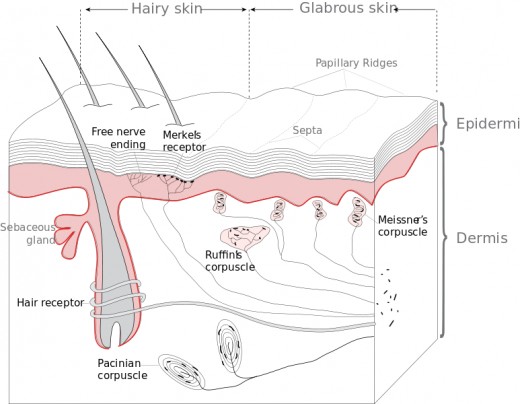There Are Numberous Reasons for Itchy Skin
Most of us have experienced itchy skin at some point. For the most part, it occurs in a localised area caused by a small insect bite or other minor irritant. However, persistent and widespread feelings of itching could be a symptom of a serious underlying condition.
 What Exactly Is an Itch?
What Exactly Is an Itch?
Itching—the medical term is pruritus—starts when an external stimulus alerts your body that some form of defence might be required. The stimulus could be anything from a tiny fibre to a bug, and it sets off a rapid response. In other words, itching results from one of your body's protective features. When something lands on your skin, there might not be an immediate reaction but as the stimulant brushes across your skin, receptors in the dermis of the skin become activated and respond. The split second reaction is in the form of a nerve impulse that goes from the skin receptors to the cerebral cortex in the brain, and a signal is sent back to cause an itch that we then scratch. The receptors involved in the itch response are the same as those involved in pain responses. Therefore, an itch can be viewed as being in a similar category as that of pain.
However, with some illnesses that may be present, other irritants within the body can cause skin to feel itchy. Mostly, these are toxins or other substances that build up due to a medical condition that may be developing. There are also natural life processes that we go through that can also contribute to feelings of itchy skin.

Skin receptors alert the brain to a stimulus brushing the skin, which will lead to an itching sensation. | Source
Ways to Stop Scratching
|
|---|
Scratching itchy skin can lead to more itching, damage to the skin, pain, and infection. Here are some tips on how to avoid scratching.
|
1. When wearing clothes, pinch the skin near to the itch site rather than scratch.
|
2. Rub or press the area with the palm of your hand.
|
3. Keep your fingernails short.
|
4. File your nails. Clipping or cutting can leave ragged edges that tear the skin.
|
5. Apply a fat-based cream to the itchy skin. This will protect the area if you do scratch.
|
There are many reasons why our skin becomes itchy, but the cause is not always apparent. There are both environmental and physical factors that will also lead to itchy feelings such as:
- Age
- Menopause and pregnancy
- Medicines
- Medical conditions, such as liver, kidney, or thyroid problems, diabetes, anemia, or poor circulation.
- Stress and anxiety
We'll take a brief look at each of these causes and give the main reasons why they may lead to itchy skin.
Age
Elderly people can be very prone to itchy skin. The medical term for this itching is called senile pruritus and can affect the whole body. It isn't clear exactly why this condition develops, but it is thought to relate to hormonal changes, deterioration in skin content, and poorer blood supply to the skin, all of which can result in itching either in a local or widespread area.
Menopause and Pregnancy
Itchy skin can happen on all areas of the body due to the lowering of oestrogen levels. Oestrogen helps the production of body oils and collagen maintenance in the skin. Low collagen and oil production can result in dry and itchy skin.
With pregnancy, there can be a higher risk of itchy skin mainly due to hormonal changes and stretching skin as the baby develops.
Medicines
The painkiller codeine can cause itchiness—which is sometimes intense—in a few people. This is one of the unfortunate side effects. And it isn't the only medicine that could cause this. Check the leaflet of any medicines, bought or prescribed, you are taking. Antibiotics may also cause itching as can all the other opiates and phenothiazines (used for some mental health conditions, severe nausea/vomiting).
Medical Conditions
General itching of the skin can be a sign of a serious underlying condition such as:
- Liver or kidney disease—in liver disease, itching of the skin is caused by a build-up of opioid peptides both in the skin and blood. When the kidneys are not working well, there is a build up of toxins in the body, which leads to skin irritation similar to that experienced when the liver is diseased.
- Iron deficiency anaemia—itching skin could be due to a number of metabolic factors.
- Thyroid problems—dry, itching skin can be a symptom of thyroid gland problems.
- Diabetes—itchy skin is also a symptom of the early stages of diabetes. It is caused by high glucose levels in the blood.
- Poor circulation—itchy skin can be a symptom of poor circulation leading to a condition called stasis dermatitis. This can cause intensely itchy skin. According to research carried out by the American Academy of Dermatology, approximately 15 million Americans over the age of 50 have this condition. Slightly more women are affected than men. Statistics from the National Collaborating Centre for Acute Care in the UK reports that around 25,000 people in the UK die each year due to complications from poor circulation conditions. For example, venous stasis can lead to life-threatening situations such as deep venous thrombosis.
Anxiety/Stress
When we are stressed for extended periods of time, the body can have an immune response that can lead to itching skin. High levels of stress activate white blood cells. These cells are always present within the skin, ready to fight off bacteria or other invaders. However, when the body is tense and anxious, these white cells are triggered and become overactive, which can cause itching.
Research carried out at Charite University in Berlin and McMaster University Canada found that high levels of stress both cause pre-existing inflammatory skin conditions to flare up and new skin complaints to develop.
Top tips to ease itchy skin
Tips
|
|---|
1. Take warm or cool showers instead of hot and use moisturiser immediately after.
|
2. Use moisturising cream at least twice a day.
|
3. Avoid harsh soaps and detergents for personal hygiene and laundry
|
4. Wear non itchy fabrics such as cotton
|
5. There are anti-itch creams you can buy and anti-histamines from a pharmacy
|
Don't Ignore the Symptoms
It goes without saying that continual itching of your skin shouldn't be ignored particularly if the itch is:
- Persistent and not relieved by over-the-counter creams or antihistamines. Antihistamines block the effect of histamine, a protein produced by the immune system to help prevent infection. However too much histamine can also cause the skin to become irritated.
- Severe, particularly if it interferes with sleep and daily routines.
- Accompanied by a rash.
- Accompanied by a discoloured are of the skin, which may bleed for no obvious reason.
- Painful and the area becomes swollen.
The majority of skin itches are not serious and usually have a mundane cause. However, as we have seen, the body can produce such symptoms to warn us that a more serious condition might be involved. If you have any concerns or see any other symptoms, speak to your doctor.
The body is very good at alerting us to situations that might be detrimental to our health. It's up to us to start listening to the signals our bodies are giving us and to act on them

No comments:
Post a Comment